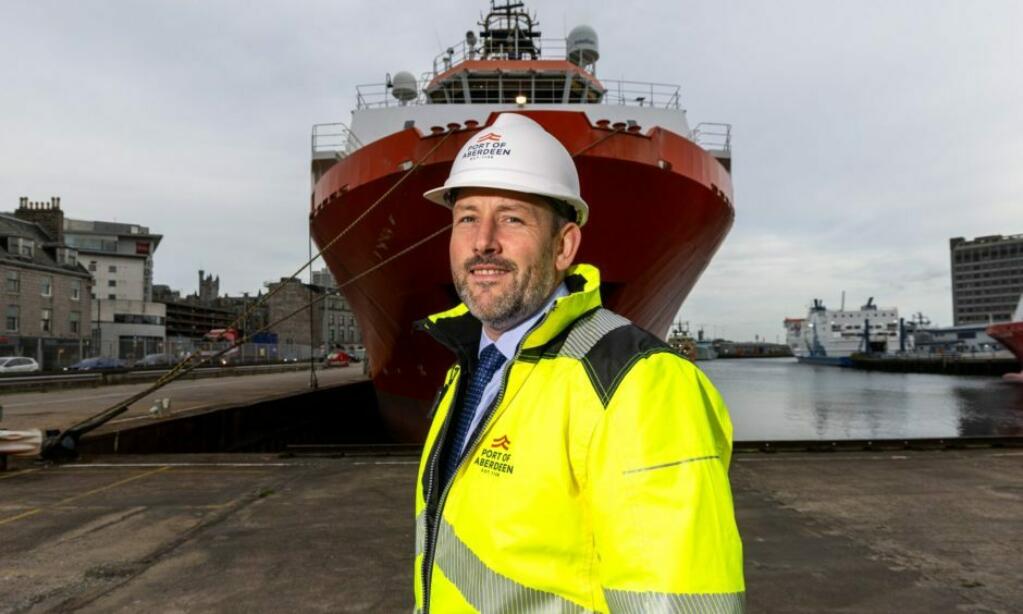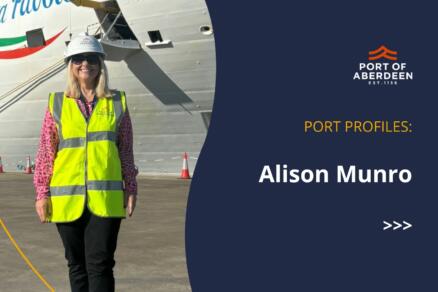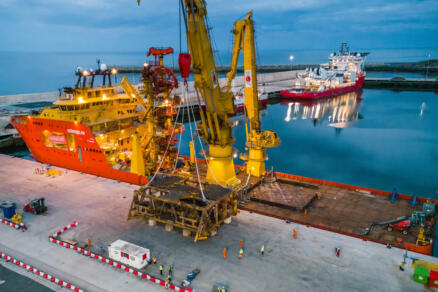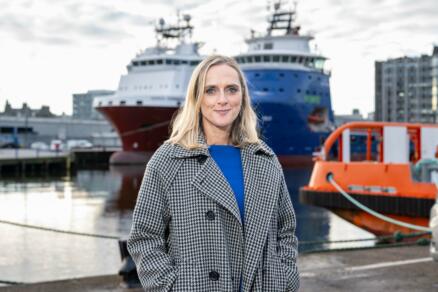
Port of Aberdeen Harbour Master on bringing 7,000 vessels into port each year

Benji Morrison talks about his exciting career at sea which set him on course to be Harbour Master at Port of Aberdeen.
Growing up on picturesque Scalpay island in the Outer Hebrides, one of the highlights for Benji Morrison was getting a shot helming the ferry.
That and the thrill of operating the boat’s car ramp either side of the five-minute passage.
“A wee thing,” he recalls. “But for a wee boy a big deal.”
Fast-forward three decades and Benji is now Port of Aberdeen’s newly minted Harbour Master.
The 40-year-old was hired as Deputy Harbour Master in January and just two months later was promoted.
It’s a big job. Port of Aberdeen handles 7,000 vessels annually, accounting for 45% of Scotland’s total vessel traffic.
New Aberdeen Harbour Master
Benji is there to oversee marine operations and ensure safety, efficiency and compliance with industry regulations.
He made the switch after working in a similar role at the busy Stornaway Port, but Aberdeen’s almost 900-year-old port is vast in comparison.
Spanning 7,600 metres of quayside and extensive operational areas, it serves a wide range of sectors, including oil and gas, offshore wind, cruise, cargo and more.
“I am fully aware that I don’t know everything yet and I still have a lot to learn,” admits Benji.
“A lot to do and a lot going on, but I am enthusiastic and energised by it all.”
Port is oldest business in the UK
Established in 1136, Port of Aberdeen is famously the oldest existing business in Britain.
Benji has come at a time of rapid change for the city and the maritime sector, but some things remain the same.
“Everything I did and have always done involved the sea in some way,” he says.
“I come from a place where we would mix the land with the sea, with crofting they would utilise all the outlying islands.
“We needed boats and ferries to get off the island, so being on boats was normal for me, it was every day.”
While his father was a fisherman, later moving into aquaculture, as a teenager Benji’s sights set were on the merchant navy.
On the advice of his careers advisor, he pursued maths, physics and English at school.
His career then began with a deck officer cadetship and Nautical Science studies at college in Glasgow. From there he rose up the ranks.
From the Baltic Sea to West Africa
“I enjoyed it. Being on the ship, being a part of the crew. There’s a lot of camaraderie. The jobs change. It’s diverse. No two days are the same.
“My last offshore support vessel was doing geo-tech drilling and we used to go to some fairly remote and odd parts.
“It’s good to see these places you might not normally get to see. When I was working on that boat, we did quite a lot of work in the North Sea, in the Baltic, Netherlands, West Africa, St Malo south of the English Channel. The options are endless really. It’s what you choose to pursue.”
Work life balance was important though and Benji counts himself lucky his trips to sea typically lasted just a few months, compared to the six-month stints of others.
He later switched to work as a maritime pilot, navigating ships in and out of port, before taking on harbour master responsibilities.
“From a Harbour Master people expect someone who is professional, competent, has a good aptitude and willing to learn,” adds Benji.
“You need to have a broad sense of what is going on. Open to new ideas and innovations.”
Investing in facilities
Port of Aberdeen has set an ambitious target to be the first UK port to achieve net zero by 2040 – its focus to reduce emissions, facilitate future fuels and to support the energy transition.
Benji says it has the advantage of being a Trust Port, which means its profits can be poured into innovating and investing in facilities.
This includes current works for shore power electrification at the North and South harbours. All efforts to reduce vessel emissions while at the port.
He is enthusiastic about being part of the port’s green journey and embracing new technology. Especially advances in autonomous shipping.
“Technology is a big thing at the moment. We haven’t seen it yet, but it has been mooted, the vessels which are autonomous. That’s the way technology is moving now.
“We can potentially sail a vessel from A to B and not have anyone on board.
“I am excited about it, but I appreciate a lot of the challenges that will come when you may have a vessel that has got no one on board.
“With everything there will be risk, but there’s mitigation we can put in place for that. The fact we have the technology to deliver that is quite exciting.”
Another challenge for Benji and his team is dealing with more extreme weather events.
“Some of the storms we have had in the past two years have seemed to create more of an adverse effect after they have gone through,” he adds.
“There seems to be a bit more damage and disruption.
“In terms of the port we just use all the information we have to make educated decisions about where boats need to be or where they shouldn’t be and what contingency plans we have in place if things start to escalate.”
Putting port on the front foot
Ships are responsible for securing their own cargo and themselves, but Aberdeen operates an open port duty.
“You may get a casualty vessel because of weather needing to come into port,” said Benji.
“South Harbour is a gamechanger for the port. Up until that point we were quite limited to some of the sizes of the vessels that we could consider.
“In terms of if a vessel needed to come in for repairs or was a casualty, we were very much restricted size-wise.
“We could still take fairly large vessels but with South Harbour we can actually explore that in a far greater scale now.”
Record profits
Greater scale means greater profits and Benji says care will be taken to invest shrewdly.
That’s already been seen in the £420 million South Harbour expansion completed in September 2023, making Aberdeen Scotland’s largest berthage port.
Turnover for 2023 was a record-breaking £45.9m, with an operating profit of £25.7m.
“Profits will increase, but with that comes additional responsibilities as to how we are going to spend that money and where we are going to spend that money,” adds Benji.
“We will invest it wisely, but we need to future-proof the port as well.
“It links into sustainability and the technology changes that are coming, how we move forward with that and make sure we are on the front foot with everything.”
Image: supplied by Press and Journal / DC Thomson.




